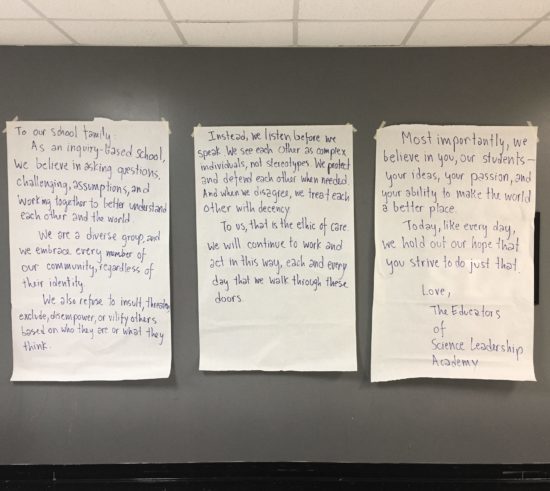
Larissa Pahomov
Faculty Advisor
In my first year of teaching at SLA — which was my first year of teaching in my own classroom — a student asked me, “do you love us?”
The question gave me pause. This was a student in the crankiest class I taught that year (hello, Fire Stream, Class of 2010) and it seemed, for a moment, that the query might be a trick. But I still knew the answer in my heart.
“Yes, of course I love you.”
The student wasn’t buying it. “What? You lyin’. We really annoy you in our class.”
Zac Chase, who was listening in, came to the rescue here: “You mean you’ve never been driven crazy by somebody you love?”
It was only a couple of years in that I came to realize how truly rare this conversation was at the high school level. Love exists between young children and their parents, with teachers serving as proxy; as those children become adolescents, the definition of love shifts towards romance. Our popular portrayals of “I love you” further narrow our understanding of the experience — with our heads full of images of (straight, white) couples in joy or anguish, we lose contact with the universal experience that love can be.
And yet. I am lucky — beyond lucky — to work at SLA. What I have witnessed here has helped expand my understanding of what love is and how it can save us.
When a student carries a friend in a cast down the stairs during a fire drill, that’s love.
When an entire advisory turns out for the funeral of a parent, that’s love.
When a teacher takes a student into their own home so they will make it to graduation, that’s love.
And when we feel concern, fear, even terror about the changing political landscape, our love for each other is not just comfort or safety, but an act of resistance against the forces that would prefer to see us tear each other down in hate rather than lift each other up.
Late in the evening of election night — but long before the results were made official — a question formed in my head: What are we going to say to the kids tomorrow?
That question lead to a few lines of text, which then became a collective letter that SLA teachers composed between midnight and 7AM the next morning. We got to school early, wrote it out on poster paper, and made photocopies for every teacher to read out loud at the start of first period.
These actions saved me that day, and it brought strength to many teachers (perhaps even more than the students).
At the end of the next day, I had a chance to debrief a bit with my advisory. I had to tell them: It’s not every teaching staff that would start a letter with “to our school family” and sign off with “love.”
And yet, I’ve been hearing and seeing expressions of love more than ever since last week. Not just in my building, or in my house, but all over this fine city.
There are some dark times ahead. But it is the dark moments that make love the most precious, the most essential. Let’s not lose that.
Leave a Reply